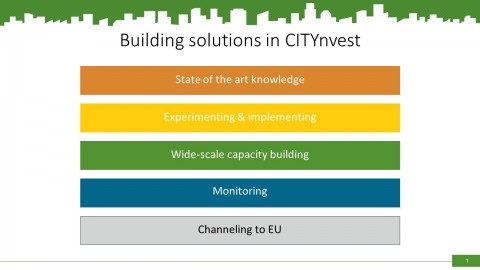We hope you will find something of value in this update and that you will share it with your colleagues.
Best wishes for the New Year,
CITYnvest team
Table of Contents
- New tools supporting local authorities in selecting the most suitable models for energy retrofits are available!
- New guide on launching a one stop shop model is now on-line!
- EU needs to overcome the challenge of financing energy efficiency investments, JRC shows
- CITYnvest and Covenant of Mayors looking for synergies
New tools supporting local authorities in selecting the most suitable models for energy retrofits are available!
The report reviews innovative financing and operational models for large-scale retrofits and explains possible mechanisms and instruments that could be used by local authorities to carry out renovation of their building stock. The report showcases the characteristics of the most effective initiatives that are currently being developed and deployed in Europe, as well as the challenges and risks inherent to each of the models. The document includes a simple tool, which helps to develop a strategic plan and an action plan.
The report is complimented by a self-assessment tool; the Recommendations Decision Matrix. The Matrix contains a set of questions, which help to determinate which model will be the most suitable for the local authority.
New guide on launching a one stop shop model is now on-line!
RenoWatt is a procurement agency, acting on behalf of public authorities, which undertakes energy retrofits in their existing buildings stock. The main principles of RenoWatt are:
- Setting-up Energy Performance Contracts (EPC), which allows to cut the energy bill and the CO² footprint of the municipalities and guarantees the energy performance of the retrofits
- Pooling of buildings, i.e. gathering buildings belonging to different municipalities in order to reach a sufficient size of a project. It allows to ensure the best renovation and maintenance price, as well as diversification of risk.
RenoWatt offers following advantages to the municipalities:
- simplification of the tendering process,
- technical audits conducted by the one stop shop and identification of the prospective investments
- drafting financial plans (analysis of the financial return)
- procurement of EPC’s (from the draft of the specifications, to the negotiation with the ESCOs)
- pooling of buildings
- search for funding
For more information on the RenoWatt one stop shop model, download the toolkit from the resources library.
EU needs to overcome the challenge of financing energy efficiency investments, JRC shows
The report addresses the need to overcome the challenge of financing energy efficiency investments. It is clear that the existing EU funding will not be sufficient to transform the EU economy from a fossil fuel based economy to a low-carbon economy unless they are blended with investments from Member States and private financial institutions. JRC points out that public finance should be used mainly to remove the policy and financial risks by establishing the appropriate de-risking financial instruments such as guarantees, to boost innovation as well as to build the technical capacity needed to develop, implement and monitor energy efficiency policies and measures.
According to the authors, the policy risks could be removed by
- encouraging the use of energy performance contracting to remove the perceived technical risk by investors,
- unlocking the utility data to establish more accurate baselines,
- developing instruments that allows for bundling small projects,
- upgrading skills,
- boosting innovation; and
- assessing energy saving by third independent parties.
Financial risks could be mitigated by developing risk sharing facilities to provide loans guarantees thus reduce the perceived financial risk through governmental guarantee of first-loss risks.
The full report is available on the JRC's website.
CITYnvest and Covenant of Mayors looking for synergies

The discussion focused around one of the main difficulties in implementation of the climate and energy actions, which is the lack of financial resources. During the meeting Elise Steyaert, the CITYnvest coordinator explained how CITYnvest can support the Sustainable Energy Action Plans (SEAPs) and the prospective synergies between Covenant of Mayors and CITYnvest.
The speech pointed out that 6,600 signatories of CoM have already defined the political commitment and have developed the measures for energy efficiency. Now, this potential should be unlocked by the access to financing for energy efficiency projects in the framework of SEAPs. The aim of CITYnvest is to close the gap between available funds and expectations of investors, and needs and capacities of local authorities. The CITYnvest project intends to make the difference by replicating solutions that actually worked and focusing on the local challenges. Thus, as stressed by the project coordinator, CITYnvest can help municipalities, regional authorities, Covenant of Mayors signatories and supporters to develop financing solutions in order to implement the actions, which they committed to in their SEAPs.
CITYnvest was well received by the participants of the workshops. They seemed to be convinced that the project is designed to meet the actual needs of local authorities.
The presentation from the workshop is available here.


